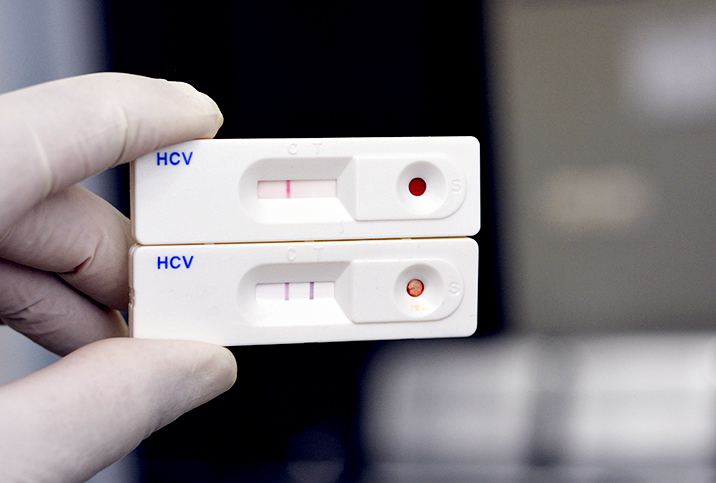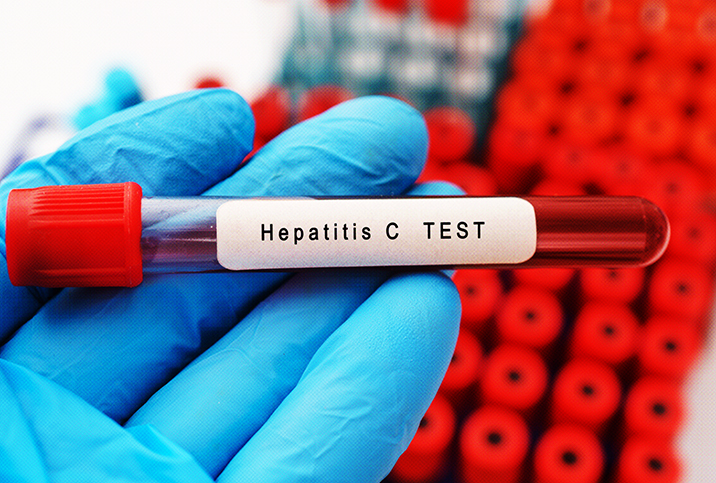Dating and Living With Hepatitis

Hepatitis is an inflammation of the liver typically caused by a virus. To avoid infection, it's important to be aware of the different types of viral hepatitis, and their various transmission routes. You also need to recognize the symptoms—if you have any, that is—so that you can seek treatment quickly and reduce the risk of conveyance.
The five types of hepatitis
There are five types of viral hepatitis infections, and they manifest in the following various ways:
- Hepatitis A. Primarily spreads through contaminated food and water and is often mild, acute and self-limiting.
- Hepatitis B. Usually results from exposure to contaminated blood and is considered a sexually transmitted infection (STI) that can lead to chronic and severe liver complications. It should be noted that a vaccine is available.
- Hepatitis C. Considered to be a blood-borne infection mainly transmitted through contaminated needles. It can cause chronic infection and severe liver damage and is treated with direct-acting antiviral medications.
- Hepatitis D. Only affects individuals with hepatitis B (HBV) and exacerbates the liver damage caused by HBV. Hepatitis D is managed by treating the underlying HBV infection.
- Hepatitis E. Primarily spread through contaminated food or water, similar to hepatitis A, this type is usually acute or resolves on its own without treatment.
"We are all at risk for hepatitis A, B and C," said Louis Morledge, M.D., a board-certified internal medicine specialist at Lenox Hill Hospital in New York City. "Since Hepatitis A usually occurs with exposure to infected food and drink, outbreaks occasionally occur in the United States. However, outbreaks happen more often in underserved countries. Hepatitis B and C usually result from exposure to contaminated blood, and therefore these populations are usually limited to injectable drug users or result from sexual promiscuity."
Some hepatitis infections may not result in symptoms until damage is already done to the liver.
"Most people with hepatitis have vague or no symptoms at all, which means they may remain undiagnosed. In most cases, a cure occurs without notice, but in some cases, the condition is discovered when complications occur," said Sara Mesilhy, M.R.C.P., a gastroenterologist with a Membership in Internal Medicine from the Royal College of Physicians of the United Kingdom.
"Complications of hepatitis include liver fibrosis, a condition caused by liver scarring, which is the most common complication," she said. "If fibrosis develops and becomes more extensive, then it is described as cirrhosis. Once developed, cirrhosis leads to many complications, such as liver cancer [hepatocellular carcinoma and cholangiocarcinoma]; portal hypertension, which causes the fluids to accumulate in the body leading to ascites and lower limb edema; and impairment in consciousness level known as hepatic encephalopathy. Another complication is fulminant liver failure, which is eventually fatal."
Hepatitis B and C are the two most relatively common and deadly forms of hepatitis, affecting as many as 2.4 million Americans. Not only do these conditions increase the odds of developing potential complications such as fibrosis, cirrhosis or liver cancer, but they may also affect an individual's sexual and reproductive health.
"Patients with active hepatitis are often less inclined to be interested in sex due to their physical health complications," Morledge explained.
"Hepatitis has an impact on sexual and reproductive health in many ways. There's a big concern about the transmission of the virus during sexual intercourse," she said. "There's concern also about the transmission of the infection to the baby. The affection of liver tissue will lead to a disturbance of sex hormones. In chronic disease, when complications occur, the patients may complain of loss of libido, disturbance in menstrual functions and problems related to sexual function."
How can you prevent hepatitis?
Prevention is key for managing hepatitis and maintaining your sexual health. You can maintain a healthy and fulfilling sex life by staying informed about the risks, practicing safe sex and avoiding high-risk sexual behaviors, and staying away from potentially infected needles or blood. If you suspect that you may have hepatitis, you should seek appropriate medical care immediately.
Condoms can reduce the risk of transmission during sexual activity, and dental dams can provide protection during oral sex and any anal contact. It's always good policy to discuss any risks of hepatitis with your partner(s). Sexually active individuals should be aware of common symptoms of hepatitis, as well as the potential asymptomatic nature of these infections.
Avoiding high-risk sexual behavior for people with multiple partners is recommended. For example, period sex can increase the risk of transmission of blood-borne infections—including hepatitis B and C—if one partner is infected.
Although hepatitis B is the only type that's considered to be an STI, there is still a possible risk of sexual transmission for hepatitis C, particularly among men who have sex with men and individuals who engage in high-risk sexual behaviors, such as rough period sex.
Other high-risk groups of becoming infected with hepatitis include people who are homeless, dependent on injectable drugs, healthcare workers because of accidental exposure to infected equipment, the immunocompromised and individuals with a history of incarceration.
To minimize the risk of a hepatitis infection, it is essential to practice safe behaviors such as using clean needles for drug use or tattooing, maintaining good hygiene and getting vaccinated.
It's important to consider regular screening for hepatitis because early detection and intervention can make a significant difference in managing the infection and reducing the risk of complications. This is especially true for hepatitis C, which has no vaccine.
Regarding treatment, hepatitis B has a highly effective vaccine that provides protection, but if you haven't been vaccinated, antiviral medications may help control the virus and limit any potential liver damage.
"Although a vaccine can prevent hepatitis B, once infected, there is no cure. If infected, preventing the spread to others is critically important," Morledge said.
There is currently no vaccine available for hepatitis C. However, direct-acting antiviral (DAA) medications have proven highly effective in eliminating the hepatitis C virus from the body in more than 90 percent of patients, often within eight to 12 weeks of treatment.
Hepatitis can be challenging
If you have hepatitis, it's essential to maintain open communication with your partner about your condition. Discuss your diagnosis, potential risks and the steps you are taking to manage the infection.
"For patients with hepatitis, infectious hepatitis, first and foremost dating tips and advice would be to protect the person your dating partner. Try to be transparent and get tested so you understand what your risk is to the other person," Morledge said. "For yourself, get treated and advise your partners to be vaccinated. This would entail practicing safe sex, which means using latex condoms. If you have hepatitis, you want to avoid getting a different strain. Of note, hepatitis B is 50 to 100 times more infectious than HIV."
Denise Pate, M.D., a board-certified internal medicine physician with Medical Offices of Manhattan, added that, "It's crucial to keep in mind that dating while living with hepatitis is possible and that having a chronic condition in no way defines you or your worth. Finding someone who loves and accepts you for who you are will not prevent you from having a fulfilling dating life."
Hepatitis can have an impact on the reproductive health of both genders. Men with chronic hepatitis B or C infections may experience reduced sperm quality and count. Some individuals with hepatitis may also develop erectile dysfunction (ED), though this is rare.
Women may have a higher risk of infertility, menstrual abnormalities or even complications during pregnancy, such as vertical transmission to their child. There have been reports of menstrual abnormalities occurring in women with viral hepatitis and some official reports on similar phenomena happening to young girls with autoimmune hepatitis, which is a non-viral form.
This is especially concerning as some researchers believe the COVID-19 vaccine may have triggered autoimmune hepatitis in some patients.
Symptoms of hepatitis may not always be present or noticeable, which is why regular screening and communication with your healthcare provider are crucial.
"In general, hepatitis patients may experience fatigue, loss of appetite, nausea, abdominal pain, joint pain and jaundice that results in yellowing of the skin and eyes. These symptoms can range from mild to severe, and they can last for weeks to months," Pate said. "Living with hepatitis can have social and emotional repercussions including facing stigma and discrimination, as well as feelings of isolation and shame as a result of their illness. To help manage these feelings, seek help from friends, family or a healthcare provider."
Misconceptions about hepatitis
There are a few misconceptions about the disease, Morledge noted, including the following:
- Hepatitis B and C cannot be spread through casual contact with toilet seats, doorknobs, sneezing, coughing, hugging or kissing.
- Hepatitis is not caused by mosquitoes.
- Hepatitis C is not rare. According to the World Health Organization (WHO), 32.5 million people have hepatitis B or C in the U.S. making it a fairly common disease.
- All those with hepatitis have jaundice or their skin turns yellow.
Aftercare for hepatitis
Hepatitis infections can be short-term or long-term, so it's wise for people in high-risk groups to be open about their history, even if they're dealing with a suspected hepatitis infection.
All types of viral hepatitis may resolve spontaneously without any medical intervention but the odds of developing a chronic infection are much higher for hepatitis B and C. Irreversible liver damage may result if the infection is not addressed, so if you suspect an infection, immediately consult a primary healthcare physician and be open about any relevant history.
Following a hepatitis diagnosis, it's important to take care of yourself and stop the infection from spreading. Pate shared some aftercare tips and advice:
- Avoid certain medications. A liver that's already under stress from hepatitis can be further damaged by alcohol and narcotics. Prescription and over-the-counter drugs that may impair your liver should be completely avoided.
- Eat a nutritious diet. Your immune system can be supported and healing can be aided by a nutritious diet. Consume a lot of fresh produce, nutritious grains, lean proteins and healthy fats.
- Good hygiene. Maintain good hygiene, since contact with tainted blood or bodily fluids can lead to the spread of hepatitis. Wash your hands frequently, refrain from sharing personal objects such as toothbrushes or razors and use barrier protection when having sex.
- Listen to your doctor. You'll most likely receive instructions from your doctor on how to take care of yourself and treat your hepatitis. It's critical to heed their recommendations, which include taking drugs as directed and showing up to follow-up appointments.
- Rest. Your body needs to rest to heal from hepatitis. If you feel tired during the day, take it easy and try to get at least seven to eight hours of sleep each night.
- You must create a plan that's right for you. Hepatitis is treatable and manageable with the right care. Together with your medical team, create a plan that is appropriate for you and follow it.
Don't let hepatitis define you
"It's critical to be honest and upfront about your hepatitis status when you're comfortable enough to share it with someone," Pate said. "This not only demonstrates that you respect and value their trust, but it also allows them to ask questions and learn more about your condition."
"Learn about your hepatitis and how it spreads so you can confidently answer any questions your partner may have," she added. "It is also advisable to educate your partner about hepatitis and how to avoid transmission. If you are sexually active, it is essential to practice safe sex to prevent the spread of hepatitis. Remember that your hepatitis is only one aspect of your life and does not define you."
You can find more information on hepatitis from the following online locations:


















